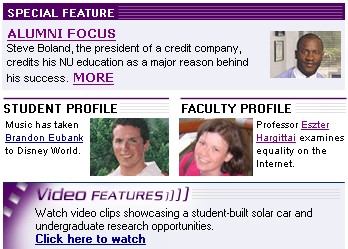Today’s Google doodle is in honor of Martin Luther King, Jr. Day in the U.S.. These doodles always link to something relevant regarding the focus of the drawing. I was especially curious to see what the target link would be in this case, given some peculiarities with the results to a search on martin luther king jr. Not surprisingly (to me), the doodle links to the search results of a somewhat different query: martin luther king jr. day, which yields a sufficiently different set of links.
Why was I not surprised and why do I take such interest in this particular case? It dates back to exactly two years ago when I was teaching my Internet and Society class to undergraduate students. At that time, Northwestern didn’t excuse students from classes for the entire day (it does now), but my class conflicted with several campus events so I decided to cancel class. However, I did want them to do some course-related work so I had them blog about something related to the holiday that they found online. It was a very open assignment, but focused enough to get some of the spirit of the holiday on their minds.
One of the students wrote an entry pointing to the Web site martinlutherking.org and discussed how she had found the site’s critical approach to the holiday and the man behind it intriguing. She cited the sources featured on the site, prominent media outlets such as Newsweek and The New York Times. I found her discussion interesting, but was a bit skeptical and so I went to look at the site. I quickly realized that it was hosted by an organization called Stormfront, which prominently describes itself as White Pride World Wide on its logo.
At this point, I was confronted with the following dilemma: Did the student choose this site while realizing its origins or did she overlook that information? If she did choose it in full knowledge about that detail, was I in any position to challenge her choice of topic for that blog post?
I decided that it was up to her to blog about that site if she wanted (so no, I would not ask her to remove the entry), but it was up to me to make sure she was fully aware of what she had done. I crafted a careful email explaining that I was not challenging her choice for the assignment, rather, I just wanted to make sure she was fully aware of the details. She wrote back and said that she had not realized the host of the site and was embarrassed about the situation. She noted that after careful consideration, she decided to leave up that entry and follow it up with another post about the interesting learning experience that this case had offered.
We ended up discussing all this in class. Note that the student remained anonymous to the rest of the class since my students blog pseudonymously so only I know their identities. They are, however, required to read each other’s posts so I knew there would be other students exposed to what she had written.
Two years ago, the Web site martinlutherking.org was the first or second result when you did a search for martin luther king jr on Google (I don’t remember its position on the other search sites). Today, it’s #7 on Google, #1 on MSN (among the organic, non-sponsored results), and not in any prominent position (not in the top 20) on either Yahoo! or Ask. The site’s position on Google’s result list is still sufficiently prominent that it would explain Google’s choice to use martin luther king jr day as the query showcased with its holiday logo. I have no idea if this was a conscious decision on anyone’s part, I am just suggesting that it might’ve been.






